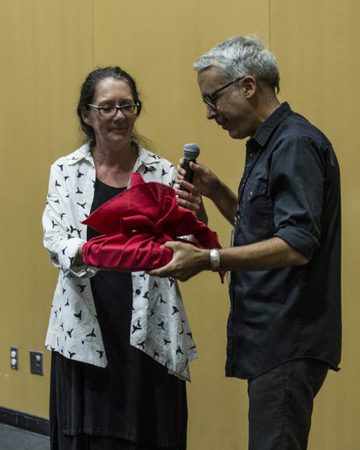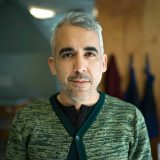.jpg) Peter Morin and France Trépanier at the
Peter Morin and France Trépanier at the
Community Feast during the
Primary Colours/Couleurs primaires
gathering. Photo credit: Kirk Schwartz.
Peter Morin: I repeat to myself,
space is complicated. Bodies are complicated. Relationships between bodies are complicated. I am not afraid of intimacy.I’m saying this over and over to myself. Quietly. There are so many people in this room. So many beautiful spirits. All powerhouses. There is also a sharpness here with us. I wonder why. And then I feel deeply that I want to cry. To weep. Deeply. Considering the beauty of these bodies and spirits. Tears that consider deeply about how much fighting we all have had to do, over a great period of years. And yet, we are all here humbly. I want to cry for all of the hard work of ancestors who got us to that room. It’s so so much. I can’t handle it. Tears because it is so much work to keep each other safe. And then I get agitated. Inside. My skin starts to get tight. I don’t know why. And I know why. The fight to keep our communities safe is so so much work. The fight to keep our respective knowledges safe is so so much work. Then I want to weep because I know how easily it all falls away.
In the opening circle we are asked to imagine being held.
I don’t feel love in this moment.
I feel being grabbed from behind, my head held under water.
I have to leave the room. I think—it is hard to remove these demons.
Outside. My sister calls me to tell me that our uncle died. It’s okay. Because I’m outside. It is lunch time. My tears belong to me. My tears belong to my family.
Outside. I make inappropriate jokes to make my sister laugh and her laughter saves my life.
Inside. I look for Ayumi. I look for Ashok. I look for Clayton. I look for Andrea. Their eyes. Their voices. Hold me. There is something beautiful in complications and we all know what to do.
Lunching in a big room. Two moderators. Myself and Sonia Robertson. Sonia doesn’t speak much English. I don’t speak much (any) French. We needed to talk before our panel. France offered to be the body and the voice that could bring these two moderators into unison. This was a beautiful moment, where France becomes all three of our voices. Languages were moved by her gestures. Voices were transformed by her generosity. I felt like I could see Sonia. I felt like I could understand Sonia. I could see her eyes.
Next. A roundtable. In the middle of a big room. We were asked to talk about reconciliation. We actually talked about complications. Complications of language and bodies and trust. Half of the bodies seated at the circular table spoke English, the other half spoke French. But the round table was actually the room. Translators were present. Translators were mediating the conversation. One voice was actually two voices. Headsets held onto the two official languages for us. I think to myself: without naming it, this room still becomes canada. But I don’t want to end in canada. The room is a landscape. Then I start feeling all of the ancestors. Knowledge systems that have converged in this one place. Gathering and exchanging knowledge. It is hard to remove canada but there are so many things older than canada to draw upon.
In the roundtable we talked about how reconciliation should not be conflated with healing.
Further Refraction/Further reading:
- Temple of my Familiar – Alice Walker
- Looking White People in the Eye: Gender, Race, And Culture in Courtrooms and Classrooms – Sherene H. Razack
- The Woman who fell from the Sky – Joy Harjo
- A Personal Matter – Kenzaburo Oe
- Custer Died for your Sins – Vine Deloria, Jr
.jpg)
Peter Morin is a Tahltan Nation performance artist, curator, and educator. In his artistic practice and curatorial work, Morin investigates the impact between indigenous cultural-based practices and western settler colonialism. This work is defined by Tahltan Nation epistemological production and takes the form of performance interventions. Morin has participated in numerous group and solo exhibitions since 1997. In 2016, Morin was the recipient of the Hnatshyn Found Mid-Career Award for outstanding achievement as an artist. Morin teaches with the Visual and Aboriginal Art Department at Brandon University. Photo credit: Gregg Staats.